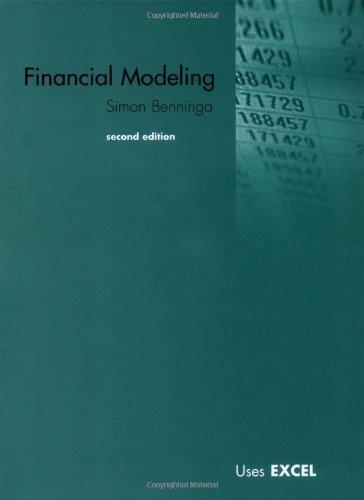Question
1.)Assume that you deposit $ 4,971 each year for the next 15 years into an account that pays 9 percent per annum. The first deposit
1.)Assume that you deposit $ 4,971 each year for the next 15 years into an account that pays 9 percent per annum. The first deposit will occur one year from today (that is, at t = 1) and the last deposit will occur 15 years from today (that is, at t = 15). How much money will be in the account 15 years from today?
2.)Assume that you deposit $ 953 into an account that pays 17 percent per annum. How much money will be in the account 9 years from today?
3.)You borrowed some money at 8 percent per annum. You repay the loan by making three annual payments of $ 200 (first payment made at t = 1), followed by five annual payments of $ 505 , followed by four annual payments of $ 797 . How much did you borrow?
4.)Compute the present value of an annuity of $ 579 per year for 22 years, given a discount rate of 9 percent per annum. Assume that the first cash flow will occur one year from today (that is, at t = 1).
5.)You just won a contest. The prize is a lump sum payment of $ 73,387 , however, you will not receive this payment for 15 years. Compute the present value of your prize assuming a discount rate of 9 percent per annum.
6.)Compute the present value of an annuity of $ 591 per year for 15 years, given a discount rate of 6 percent per annum. Assume that the first cash flow will occur one year from today (that is, at t = 1).
7.)Several years ago, Bill Smith borrowed $125,000 to buy his house. He has a 15 year, monthly payment mortgage with an interest rate of 8.75 percent per annum. Bill is thinking about refinancing his house so he would like to know the payoff on his current loan. Assuming that he just made payment number 89 , compute the payoff on Bill's loan.
8.)I plan to deposit $ 120 into my retirement every year for the next 25 years. The first deposit will be made today (that is, at t = 0) and the last deposit will be made at the end of year 24 (that is, at t = 24). I plan to make no other deposits. Assuming that I will earn 10.30 % p.a. on my retirement funds, how much money will I have accumulated 36 years from today (that is, at t = 36)?
9.)Assume that you deposit $ 591 each year for the next 15 years into an account that pays 11 percent per annum. The first deposit will occur one year from today (that is, at t = 1) and the last deposit will occur 15 years from today (that is, at t = 15). How much money will be in the account 15 years from today?
10.)How much must you deposit in an account today so that you have a balance of $ 17,224 at the end of 8 years if interest on the account is 9 % p.a., but with quarterly compounding?
11.)The Milken Company is offering you an investment that promises you $10,000 at the end of 6 years if you invest $ 6,041 today. What is the annual return on this investment?
12.)Sam refuses to retire until his retirement account has a balance of at least $ 440,376 . Sam refuses to make any more deposits in the account. The account currently has a balance of $ 139,932 and earns 6% per year, compounded semi-annually. How long does Sam have before he will retire?
How to solve problems...not just answers please.
Step by Step Solution
There are 3 Steps involved in it
Step: 1

Get Instant Access to Expert-Tailored Solutions
See step-by-step solutions with expert insights and AI powered tools for academic success
Step: 2

Step: 3

Ace Your Homework with AI
Get the answers you need in no time with our AI-driven, step-by-step assistance
Get Started


